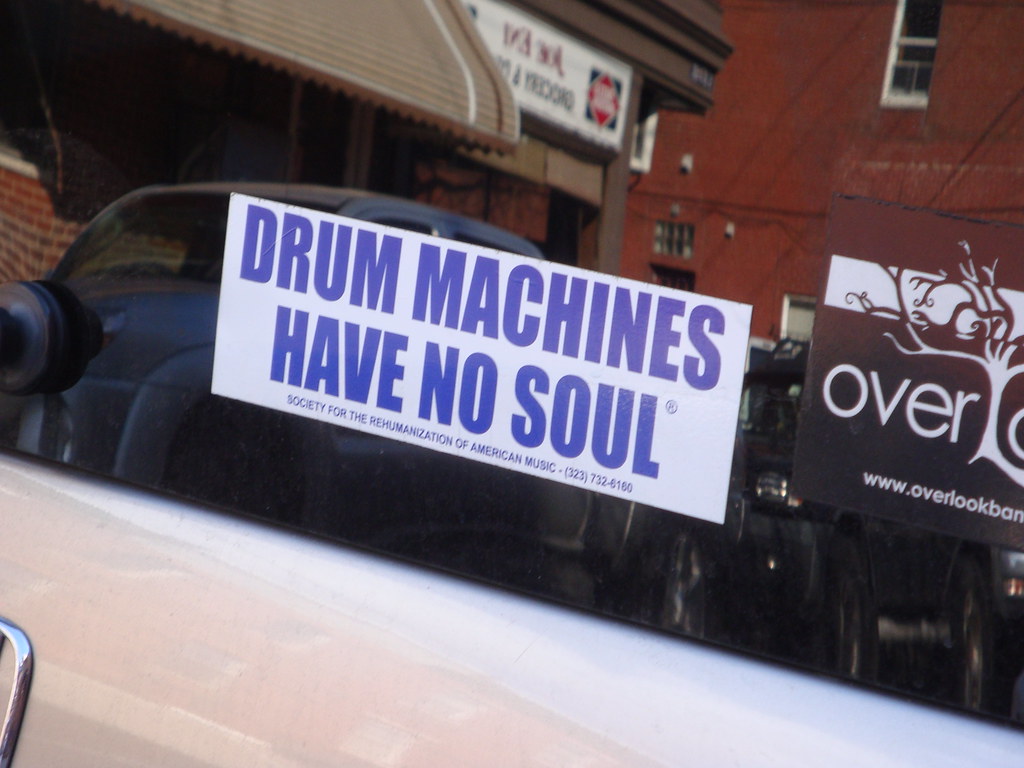
Generative AI (ChatGPT, Stable Diffusion) is a Drum Machine
In 2004, John Wood, a pianist from Los Angeles launched a bumper sticker campaign announcing “Drum Machines Have No Soul” accompanied by a phone number for the Society for the Rehumanization of American Music. This announcement of frustration with a sterile audio creative tool resonated enough that it soon became a popular slogan stuck on cars across the US.
Mr. Wood wasn’t wrong, but he wasn’t seeing the bigger picture.
Creatives have always used an evolving set of tools, including technology, to broaden and diversify how art and ideas are communicated. Ink and pigments in and on various mediums (paper, canvas, plaster) pushed out charcoal mixed with animal fat on cave walls, the printing press, Lithography, the Trautonium synthesizer, AARON, Yamaha DX7, Photoshop, MIDI, Ableton Live, …all of these things are inventions and technological developments for creative tools.
We can renounce their presence in the world and get left behind. Or we can embrace the technology and learn to use it well and make it better.
ChatGPT, Stable Diffusion and other generative AI pulls from existing material – everywhere. Early digital synthesizers and sound packages came with hefty licensing agreements when used in commercial settings because it needed a source as a starting point. We have the same clear ethical and intellectual property concerns with generative AI widely emerging into the public until GANs (Generative Adversarial Networks) are more widely adopted and accessible for semi-supervised learning to better control for bias, IP infringement and overfitting.
Generative AI is still in its infancy. Right now, it’s a great starting point to jolt the creative process in motion when paralyzed by a blank page, a vague creative brief, or an overwhelming deadline. Only an extremely small handful of artists have learned how to manipulate the data inputs and queries to generate something truly artistic to date without any modification by a human afterwards.
As it evolves for the ease of public use, AI will need more controls for the inputs to better handle the ethical issues with its output. Appropriately eliminating bias and encouraging diversity will only come from better input controls. As will respecting the IP of humans.
ChatGPT Query Example
A clear example of the sterile text output from Generative AI can be seen from these queries:
- Can you generate a snarky Ad agency Superbowl bingo game card?
- Can you generate a snarky Ad agency Superbowl Bingo card in the tone of comedians Jeff Ross and Michelle Wolf?
- Can you generate a snarky Ad agency Superbowl Bingo card in the tone of comedian Jon Stewart?
The content generated more closely represented a Top 10 list and not enough content for a standard bingo card. All three queries had the same subject in the same line and the content. For example, all three referenced a car commercial in the first line, a celebrity endorsement in the second and a sports figure in the last line.
A human untrained in copywriting made these queries (as clearly observed by the “you” referenced in the query) and received these sterile responses with a clear and predictable pattern; similar to the early drum machine sounds that all sounded exactly the same from one record to the next. But over time, the humans using the tool got better at using it and over time the tool was improved along with it.
Where is this going to take us?
Before and since Mr. Wood’s pronouncement, we’ve had many iterations of the ‘drum machine’ and artists who have mastered it. Trent Reznor, Atticus Ross, and Jon Batiste scored a movie ironically titled “Soul” for which they won an Oscar with their moving and powerful music. These humans have worked with and improved upon their tools for decades and clearly mastered the tools and varying technologies for their art that transcends any instrument at their disposal.
We’re already seeing pioneers using this new creative tool. Award-winning, French music producer and DJ, David Guetta, has already used generative AI in live shows.
The more we embrace the tools at our disposal with positive curiosity, empathy and passion, the more they will improve.
It still takes a human to operate a drum machine, or generative AI.
If you would like to see how Incubeta are using their in-house cloud data pipeline tools and analytics services to help their clients take advantage of all these benefits (and more!), please reach out.
Browse: Industry Insight
Read Next
Find out how we can help you
With offices around the world, we can build a team perfect for your needs.

